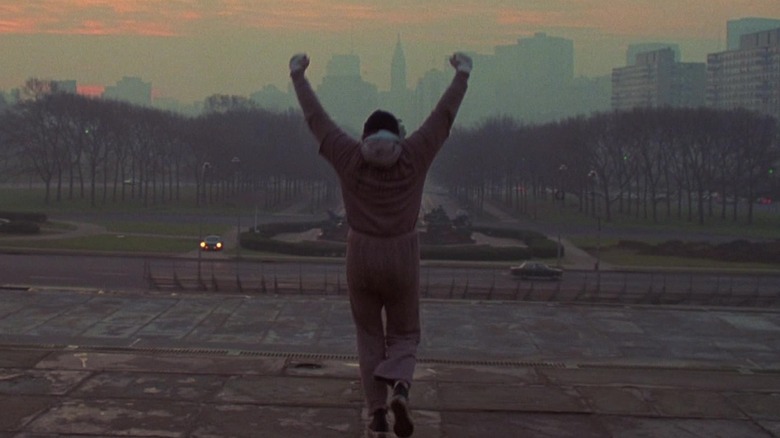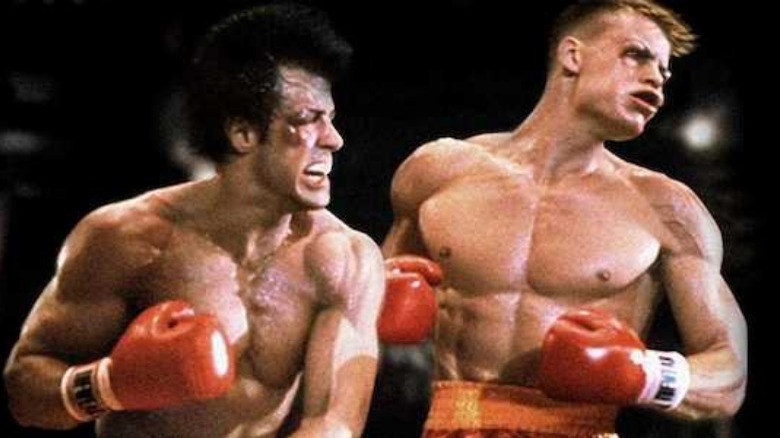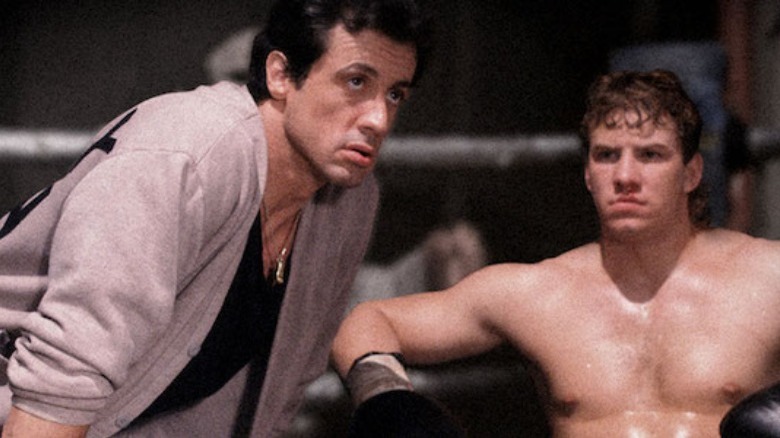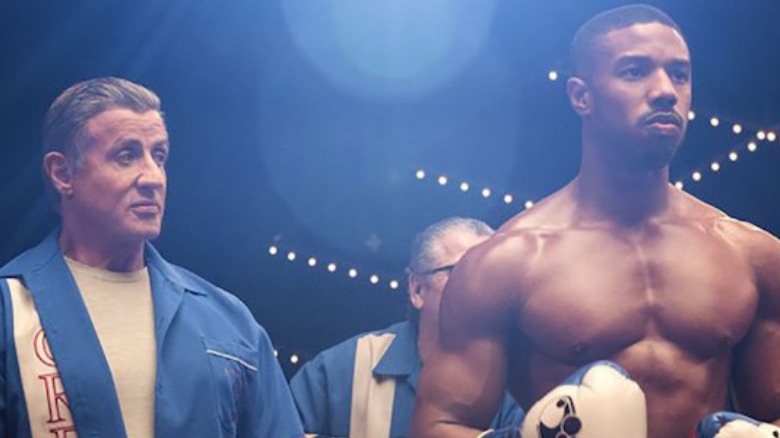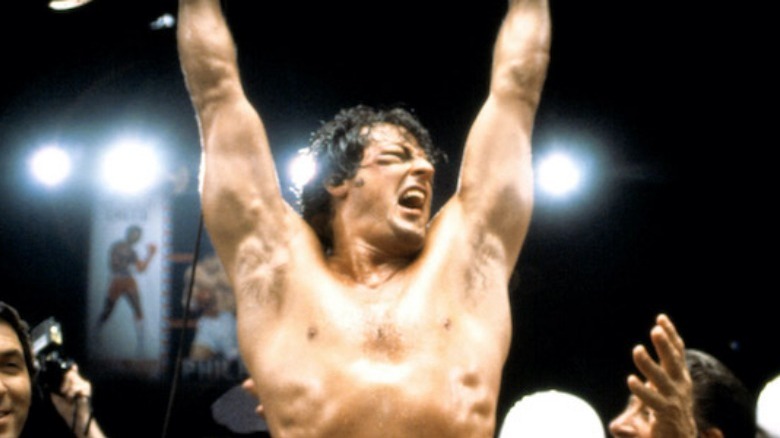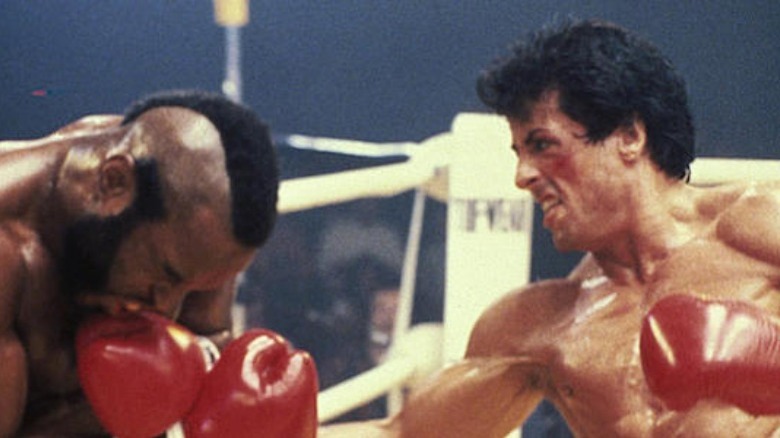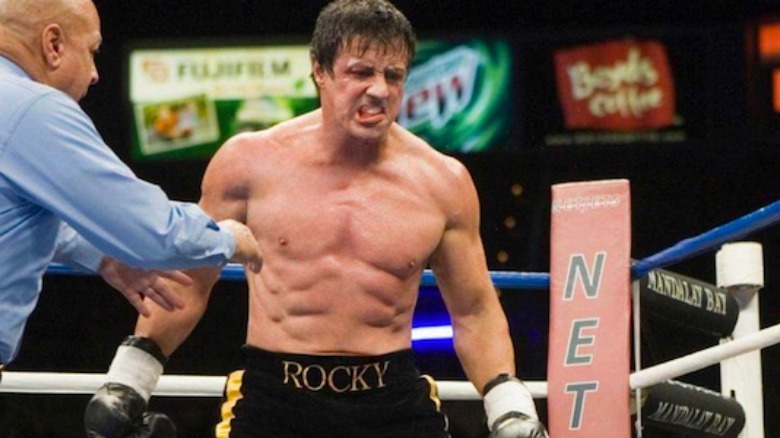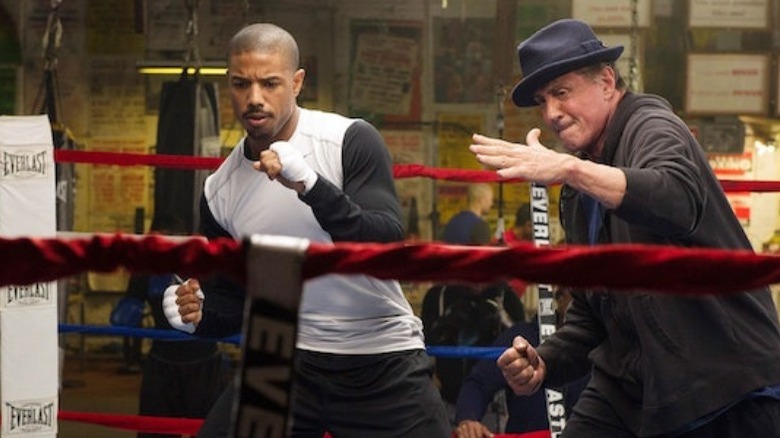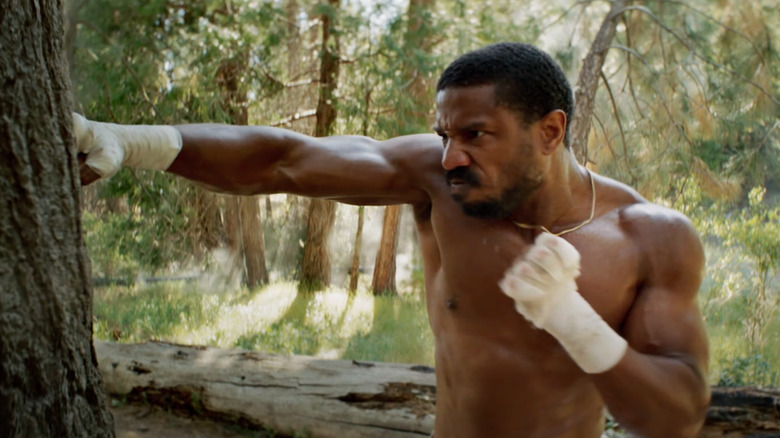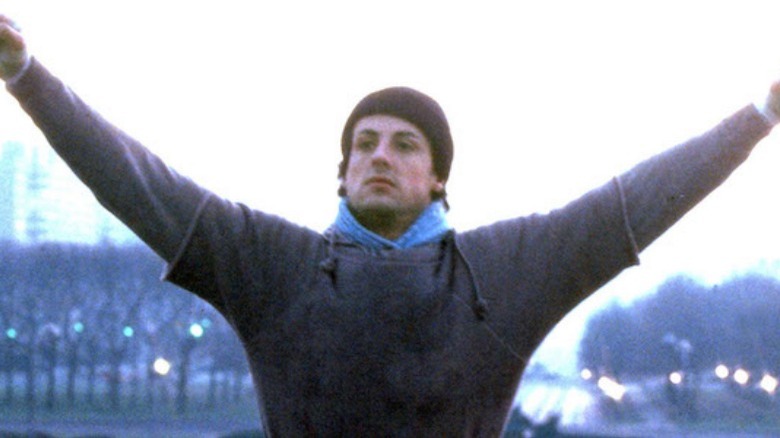Butkus To Punchy: All 9 Rocky Movies Ranked From Worst To Best
Forget Marvel and forget the "Fast and the Furious." The greatest long-running series of all time belongs to Sylvester Stallone's "Rocky" films. Since 1976, viewers have followed both Stallone and the Italian Stallion through ups and downs that can only come with over 40 years of life and experience. "Rocky" is also a uniquely American story of opportunity paired with the determination required to become a champion at something. You have a lot of options when it comes to binging, but keep in mind that pretty much everyone loves a good "Rocky" movie. If you can only watch a few, here's how they rank. Even the worst of these nine films is pretty darn special.
9. Rocky IV
Yep, I'm making everyone mad first step out of the gate. But hear me out on this one. "Rocky IV" is a stupendous bit of '80s entertainment. You turn it on and the whole thing just flies by. Before you know it, Rocky has defeated Communism and won revenge for the death of his good friend Apollo Creed. It's a blast.
The problem is that the Rocky in this film does not feel much like the Rocky Balboa we've come to love. He's hardly a character at all. In fact, no one, save for the immutable Apollo, gets any chances for character work here. There is a bit where Rocky talks to Apollo's trainer Duke (as much a series mainstay as Paulie or Apollo) that almost feels like a real movie scene, but doesn't quite get there.
"Rocky IV" is silly fun, a skeleton of a film held together through a series of montages. Candy is cool, but you shouldn't make a meal of it.
8. Rocky V
Is ranking "Rocky IV" last blasphemy because it's so good or because "Rocky V" is so bad? I've noticed many who hate "Rocky V" seem to do so blindly, having never seen the whole film or watched it too long ago to remember with much detail.
Let me fill in some blanks. "Rocky V" is not great. Some poor casting and music choices keep it from being all that likable, even. But it is a movie about the Rocky character in a way "Rocky IV" is not. Bringing Rocky back to street level is a good decision, though much of the film feels like a superfluous dry run for both "Rocky Balboa" and "Creed" (if you love those films, "Rocky V" is kind of a necessary beast). I'd rather have this extra two hours with Rocky than not. And he's a dumb chatterbox again!
Look, those Mickey scenes are extremely emotional. Seeing Sage Stallone act with his father is a big deal as well. And were it not for the bad (so, so bad) '90s music at the end, the film's climactic street fight would be remembered much more fondly. Give this one another chance. You won't love it, but you may learn to like it more than expected.
7. Creed II
The main problems with "Creed II" are all about justification. You can see why the generational story of Apollo Creed's son fighting Ivan Drago's son would be hard for Stallone the screenwriter to resist. It makes for a great poster, especially with all the people who might only know Rocky from "Rocky IV."
But the narrative justification is not there for Adonis Creed. Why does he need to fight this guy? We never get a convincing answer. Viktor Creed's lack of motivation is actually pertinent to his character, but Adonis frequently looks like a jerk in this movie largely because the filmmakers never figure out what's motivating him. In the meantime, the film runs through a mild remake of "Rocky II" and leads to a good training montage (in which Adonis learns new fighting techniques that are barely explained) and a solid fight. It's not a bad film by any means, but too often it feels unneeded, existing more for the Drago's benefit than Adonis or Rocky's.
6. Rocky II
It's easy to dismiss "Rocky II" as a redo of "Rocky" where, this time, he wins. And yeah, it is kind of like that. Deep down, we all know that Apollo should have damaged Rocky beyond any hope of a rematch. But that's not how movies work. And if you have to have a sequel, teaching southpaw Rocky to lead with his right is just wild enough to feel justified. He has the heart of a champion, after all (so long as he gets Adrian's blessing). Might as well see him defeat Apollo, even if it defies logic.
But "Rocky II" is special for other reasons. It's the last bit of "human" Rocky Balboa we'll see for a while. It's nice to spend more time with him in his youthful chatty meathead phase. And Rocky's reason for returning to face Apollo makes sad sense: He can't read, and he blew through his previous winnings like a child with his first allowance. He either fights or goes back to breaking legs for Tony Gazzo. Considering all that, it's a blessing he manages to survive, much less win.
5. Rocky III
If Rocky is going to be an '80s cartoon, this is the way I want it done. Yes, Rocky is borderline smart now and has something like .2% bodyfat. He's transformed from a street-level thug to a full-on Stallone megastar. He's still Rocky, but you have to use your imagination.
That would be fatal if not for Mr. T's incredible Clubber Lang, the most underrated character in the series. Of course Rocky's movie tells us that Clubber Lang is a villain, but you don't have to believe it. He might not be very nice, but Lang is a truly independent challenger who trains and manages himself as he rises through the ranks without compromise. Meanwhile, Rocky's in a mansion defending his title against hand-picked chumps.
In other words, this is a film where you really want to root for the bad guy. And until Mickey dies, there is no reason not to. The focus then shifts to the only thing better than Clubber Lang: Rocky and Apollo's training bromance. It is just too good, eons better than the "Rocky IV" montage everyone loves so much because it features a whole three-act arc within itself while also teaching Rocky something that actually helps him in his fight (and that skill is, uh ... how to actually box). Rocky's rematch with Lang is the only non-montage fight for a reason. By the time we get there, we are more than ready for Rocky to put Lang down quick.
4. Rocky Balboa
Don't ever laugh at Stallone. He's at his best when he's underrated. In 2006, the idea of making an old man Rocky movie was a joke. Yet here comes Stallone, visibly aged and hurting from a long string of flops, delivering the second-best film to bear the Rocky name.
"Rocky Balboa" takes what almost worked in "Rocky V" and simply adds a couple decades of loneliness to it. With Adrian dead, Rocky stalks Philadelphia like a ghost until a televised mock fight gets him back into one last big battle, this time to aver his own personal relevance. It's such a small, quiet movie, a mediation on sadness and loss just as much as perseverance and strength. It would be overwhelming if Stallone didn't structure it so well, building toward a quick but satisfying training montage followed by one of the series' more realistic fights. Were you to just watch the first film and this, you'd have a perfect double feature.
3. Creed
"Rocky" is very much Sylvester Stallone's baby. He wrote every film in the series and directed all but the first and fifth entries. After "Rocky Balboa," he'd said pretty much all he had to say about the character.
That might have been the end of Rocky's story, but then the greatest thing happened: a creative handoff to a young and hungry talent capable of seeing the character through new eyes. Ryan Coogler managed the impossible with 2015's "Creed," which simultaneously started a new franchise while also serving as a deeply respectful seventh entry to Stallone's. "Creed" is very much a sequel to "Rocky Balboa," and yet makes Balboa second to a main character who seems his opposite: cocky, smart and brash.
"Creed" succeeds for a lot of reasons, but a big one is the way Adonis challenges Balboa and drags him kicking and screaming into the 21st century, both in the text ("What cloud?") and technique (that one-shot boxing match mid-film is a thing of beauty that Stallone would never attempt), making a dusty icon surprisingly relevant once again. It's a "Rocky" movie through and through, but also a masterpiece in its own right for a generation who might not even know who Rocky is.
2. Creed III
Call it hyperbole if you want, but "Creed III" is the best entry in the "Rocky" franchise since the original. While the threequel, directed by star Michael B. Jordan, leans on familiar tropes to chronicle the further adventures of Adonis Creed, this chapter branches off into exciting new directions and puts a relatively fresh spin on an old formula.
The secret ingredient to the film's success is Jonathan Majors, who delivers an incredible performance as Creed's pal-turned-nemesis Damian. The character easily ranks amongst the elite Rocky foes. He's both dangerous and surprisingly sympathetic. Jordan matches Majors pound-for-pound and takes center stage now that Rocky has vacated the premises; his absence works in the film's favor, as Jordan no longer resides in Stallone's enormous shadow. Don't worry, though. The "Rocky" vibe remains, thanks to a handful of exciting fight sequences that should make "Rocky IV" (and "Dragon Ball Z") fans giddy.
Even so, "Creed III" keeps the drama front and center. Writers Keenan Coogler, Zach Baylin, and Ryan Coogler spin a wonderful character-driven tale about revenge, sacrifice, regret, and forgiveness that's sure to keep viewers on the edges of their seats. It may not come with the action-packed gusto of "Rocky III" or the patriotic fervor of "Rocky IV," but "Creed III" packs a dramatic punch powerful enough to push it into the upper echelon of "Rocky" movies. In fact, it might go down as one of the all-time great sports films.
1. Rocky
Not much suspense here. There's no getting away from the original's supremacy. And there's also not much new that can be said about 1976's "Rocky." It's not a cartoon, very little of it has to do with boxing, and it's mired in a grimy realism the series would never see again. You could show it to anyone and they'd probably get caught up in Rocky's story. It's definitely going to surprise folks expecting Rambo with boxing gloves. No number of decades or sequels can dull the feeling of triumph "Rocky" delivers in its final moments. It's one of those rare films that make you cry because you're happy rather than upset.
